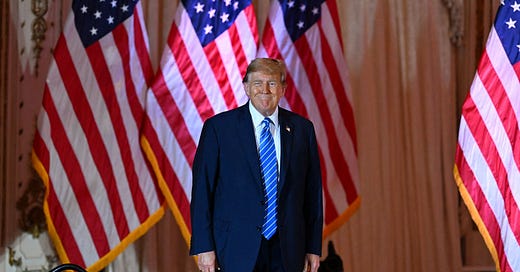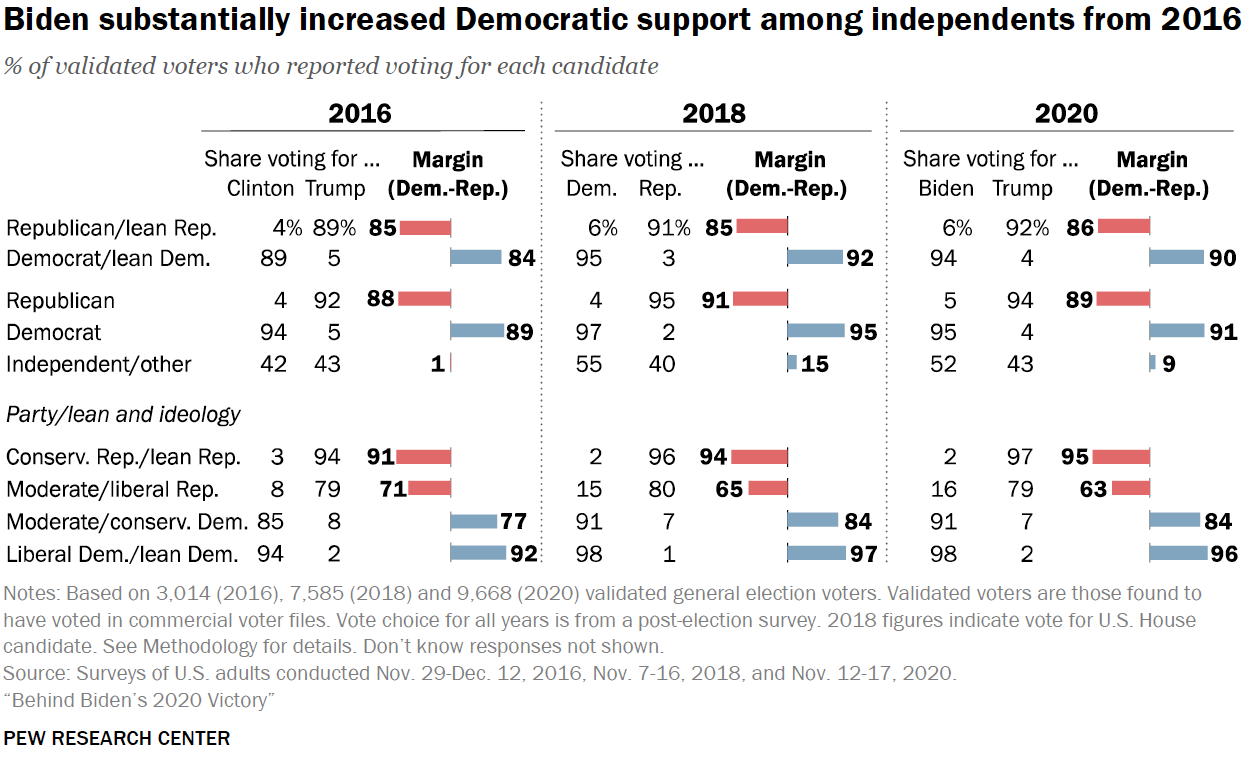What’s Next For Independents?
After moving decisively towards Democrats, political independents appear more evenly split in 2024.
The movement away from two-party identification has intensified in recent years, with independents now making up around one-third of the electorate, and an even larger percentage of Americans overall. It’s important to recognize that independents are not a uniform group, and so their motivations and voting behavior differ from year to year. The group remains roughly comprised of a large pool of ideological moderates, two kinds of populist voters, and those who are politically disengaged.
Understanding the diversity of thought among independents, we can still examine recent trends with these voters and see how their past behavior might compare to 2024 when all the data is finalized.
For example, looking at Pew’s validated voter studies over the past few cycles, Donald Trump narrowly won independents on the whole (including party “leaners”) by a 43 to 42 percent margin in 2016 only to lose the group by 9 points to Joe Biden in 2020, 52 to 43 percent. Democrats also won independents by an even wider 15-point margin in the 2018 midterms when they regained control of the House of Representatives.
Although we won’t have comparable data for 2024 from Pew for a few months, the national exit poll for this year shows Harris winning all independents (including leaners as does Pew) by a 49 to 46 percent margin after Biden carried the group 54 to 41 percent in the 2020 exits. Despite Trump losing independents overall again in 2024, his 10-point improvement in the margin from 2020 (even if smaller in the validated data next year) clearly helped him to win a decisive if narrow popular vote and Electoral College victory this time around.
Regardless of the finality of the data at this stage, the trends are basically the same across all sources: Trump with a narrow independent win in 2016; Biden with the big advantage in 2020; and Harris likely with a narrow lead among independents in 2024.
What does the recent movement among independents tell us?
In pre-election surveys, independents favored Trump over both Biden and Harris on the two most important issues this cycle—the economy/inflation and immigration—while also trending more conservative on hot-button cultural issues. In contrast, independents generally favored Biden and Harris slightly more than Trump on a host of personal character issues and abortion.
Independents are a skeptical bunch—unimpressed with partisan rhetoric and propaganda and more “show me, don’t tell me.” If Trump and his party can continue to improve with these voters, particularly by delivering positive results on the two big issues of the economy and immigration, Republicans could conceivably maintain their grip on power and perhaps expand these gains in upcoming elections in 2026 and 2028.
However, Trump and the GOP shouldn’t count on independent support going forward.
We know that independents react strongly to economic conditions and do not particularly like the ideological agendas of either party when it comes to policies on economic growth, jobs, inflation, taxes, and spending. Trump’s proposals for across-the-board tariffs, extensive deregulation, and big new corporate tax cuts could turn out well in the eyes of these voters—or not. Likewise, Trump’s leadership style remains a wild card. Some aspects of his “bull in a china shop” demeanor might go over well with independents, while several more years of chaos, incompetence, and corruption like his first term will not.
It remains to be seen how Trump handles his new mandate and if he does things differently than last time.
Given the inherent distrust and lack of interest in politics among many independents, it is best to exercise some caution in anticipating their reactions to future events and when examining possible vote intentions.
Independents are growing both in size and electoral power almost organically. No party actually represents independents or has the allegiance of these voters, despite some leanings given the forced two-party system. They remain a diverse group in terms of their economic, social, and cultural views. They do not like politics to begin with and do not trust either conservative or progressive partisan media outlets to tell the truth and present unbiased information. Third-party and other emerging membership groups capture some aspects of their opinions, but not fully.
If Democrats want to regain their advantage with independent voters, they will need to present a party brand, leadership, and agenda that is more “pro-worker, pro-family, pro-America” and less ineffective big-government spending and cultural extremism. If Republicans want to gain more support from independents, they will need to show them that they can govern the country respectably as a majority party committed to widely-shared economic growth and common-sense social policies—not excessively online, right-wing culture wars.
Given the internal dynamics and incentive structures of both Democrats and Republicans—and their relationship to ideological outliers within their respective coalitions—it seems unlikely that either party will figure out how to better represent independent voters permanently.
But whichever party manages to get closer to the median independent voter sooner will likely reap the rewards in upcoming midterm and presidential elections.







I am someone who used to be classified as a leftist, but am now classified incorrectly by others as "right wing." I am not "moderate." I am an independent thinker and I voted mostly Democrat until recently, switched to Independent at th end of the Obama administration. There is, however, a disadvantage to being officially classified as Independent on voter registrations in my state, as we can't vote in party primaries and the Republican Party barely exists here.
I usually do not identify with any of the descriptions of Independent voters that are offered in articles on this site or elsewhere. I vote for issues that I care about and candidates that I think might advocate for the policies I want to see implemented. I am very politically engaged.
I think that the woke movement is the worst thing that has happened to the U.S. in my lifetime, with respect to overall degradation of our country. The dissolution of our southern border is related to woke politics, although not entirely. The same is true of the crime problem. I don't know if this position is still labeled by Democrats as a "right wing culture war," but who cares?
Both the Democrats and the Republicans have been controlled for decades by the most extreme members of their parties and have rendered themselves unfit to provide candidates who represent the interests and needs of the majority of the American people, which includes me.
Good analysis.
Not surprised that "independents" don't like national politics - outlets, including PBS, are blatantly bias.
I think local politics differ: when it comes to your home or community, my guess is independent are more invested.l